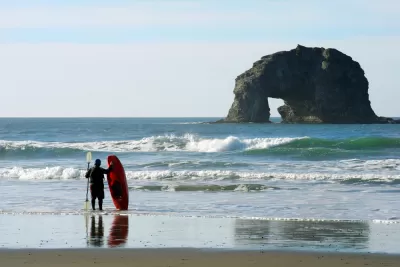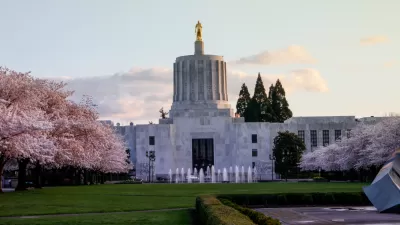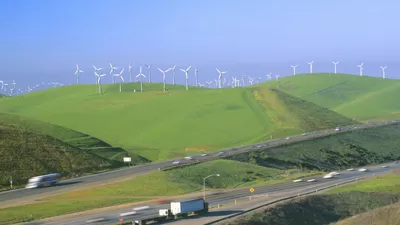Republican state lawmakers repeated a tactic they successfully deployed last summer to prevent the passage of a bill that would have made Oregon the second state, after California, to place a price on carbon emissions from most economic sectors.

"Inside the Salem statehouse Monday morning, the desks on one side of the Senate chamber were empty....For the second time in eight months, Oregon Republicans walked out of the capitol, denying the Democratic supermajority a chance to pass a bill that would limit greenhouse gas emissions," reports Reis Thebault for The Washington Post on Monday, Feb. 24. "By absconding, the 11 GOP lawmakers prevented the quorum necessary to vote on the legislation and forced Democrats to adjourn for the day."
NPR reported on Tuesday that House Republicans also fled the Capitol. [Listen/read the two-minute report by OPB's Dirk VanderHart.]
"SB 1530 would cap the greenhouse gas emissions allowed by the transportation, manufacturing and utility sectors, and lower the cap over time," reported VanderHart and Lauren Dake for OPB on Tuesday. "Large emitters would be required to obtain credits for each metric ton of emissions and could trade those credits among themselves."
A symptom of the urban-rural divide?
While the walkout is entirely partisan, it is also largely geographic and demographic.
"The stalemate illustrates the deep divide between the state’s densely populated, ultraliberal urban enclaves — such as Portland and Eugene — and its sprawling rural counties with proud libertarian streaks, where militia occupations and secession movements have found boosters," continues Thebault.
To some observers, the standoffs portend a grim future for state politics. Also this month, a Republican-led group, Move Oregon’s Border for a Greater Idaho, circulated a petition to move Idaho’s border to the west, subsuming Oregon’s rural eastern counties. The effort is unlikely to succeed, but it plainly exemplifies the state’s widening gulf.
Oregon has been a Democratic trifecta, meaning one party holds both houses of the state legislature and the governor's office, unlike divided government, since 2013, according to Ballotpedia. In the 2018 election, Democrats gained the three-fifths supermajorities in the state’s House and Senate needed to hike taxes, and Gov. Kate Brown, also a Democrat, was narrowly re-elected to her first full term with 50 percent of the vote, reported VanderHart and Dake on Nov. 6, 2018.
She won a special election in 2016 to fill the remaining two years of former Gov. John Kitzhaber’s term.
However, one look at the largely red county map of the state showing the 2018 gubernatorial election results further illustrates the urban-rural divide. Only seven of the state's 36 counties, less than 20 percent, are colored blue.
'Quorum politics' shuts down the government
"Without at least two Republicans showing up in each chamber, Democrats can’t achieve the two-thirds quorum necessary to conduct business," reports VanerHart on Feb. 26. Two Republicans remain, one senator and one representative, both from "Bend districts where registered Democrats outnumber registered Republicans."
Many other important bills in addition to climate legislation have stalled as a result, including "budget adjustments for troubled state agencies, making it easier to site homeless shelters," and wildfire and forestry legislation.
Short 2020 legislative season
The 35-day legislative session that began on Feb. 3 ends on March 8, and only three bills have passed both chambers, noted VanderHart on Wednesday. VanderHart and Dake reported on Jan. 31 on the special session (audio available) that foreshadowed trouble with the carbon bill.
While the overall framework of the new climate bill, Senate Bill 1530, is similar to last year’s, the new legislation also contains tweaks that ease regulations on industrial manufacturers and rural areas of the state. Under the latest conception, for instance, most of the eastern 60% of the state would see no regulation on auto fuels.
But Republicans are still adamant that the cap-and-trade system would be too costly for Oregonians, and are showing no signs they’ll be willing to stay in the building to vote “no” on the bill.
The Republican legislators have indicated that they would return if the Democrats were willing to make the cap-and-trade legislation a state ballot measure, similar to the carbon tax and carbon fee measures defeated by Washington voters in 2016 and 2018, respectively.
"For the Democrats, at least so far, that appears to be a nonstarter," reported VanderHart and Dake on Feb. 25.
Related in Planetizen:
-
What Went Wrong With Oregon's Climate Bill? July 2, 2019
- Oregon Democrats Unveil Cap-and-Trade Bill, February 12, 2019
- Advocates for Oregon's Carbon Pricing Plan Proceed Cautiously, December 12, 2018
FULL STORY: Oregon lawmakers were supposed to vote on a climate change bill. Republicans walked out — again.

Maui's Vacation Rental Debate Turns Ugly
Verbal attacks, misinformation campaigns and fistfights plague a high-stakes debate to convert thousands of vacation rentals into long-term housing.

Planetizen Federal Action Tracker
A weekly monitor of how Trump’s orders and actions are impacting planners and planning in America.

In Urban Planning, AI Prompting Could be the New Design Thinking
Creativity has long been key to great urban design. What if we see AI as our new creative partner?

King County Supportive Housing Program Offers Hope for Unhoused Residents
The county is taking a ‘Housing First’ approach that prioritizes getting people into housing, then offering wraparound supportive services.

Researchers Use AI to Get Clearer Picture of US Housing
Analysts are using artificial intelligence to supercharge their research by allowing them to comb through data faster. Though these AI tools can be error prone, they save time and housing researchers are optimistic about the future.

Making Shared Micromobility More Inclusive
Cities and shared mobility system operators can do more to include people with disabilities in planning and operations, per a new report.
Urban Design for Planners 1: Software Tools
This six-course series explores essential urban design concepts using open source software and equips planners with the tools they need to participate fully in the urban design process.
Planning for Universal Design
Learn the tools for implementing Universal Design in planning regulations.
planning NEXT
Appalachian Highlands Housing Partners
Mpact (founded as Rail~Volution)
City of Camden Redevelopment Agency
City of Astoria
City of Portland
City of Laramie





























